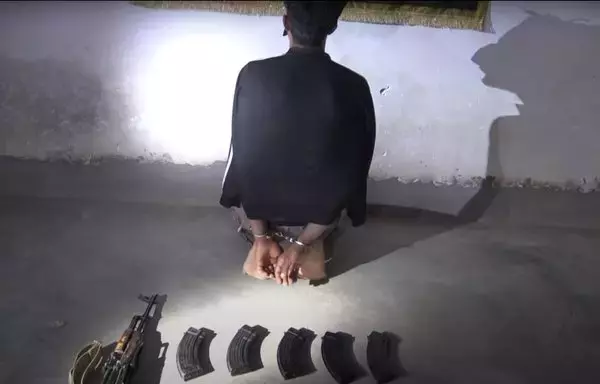Security
Syrian regime blamed for fueling Deir Ezzor clashes
Local residents say the Syrian regime attempted to portray the recent fighting as an Arab-Kurd dispute, though the reality was more complex.
![Fighters from the Syrian Democratic Forces conduct a security sweep in Deir Ezzor on September 1 as part of the recently concluded Operation Security Reinforcement. [Syrian Democratic Forces]](/gc1/images/2023/09/07/43779-SDF-deir-ezzor-600_384.webp)
By Samah Abdul Fattah |
The situation in the eastern province of Deir Ezzor is moving towards calm after the Syrian Democratic Forces (SDF) on Wednesday (September 6) declared the "end of military operations" following days of deadly clashes, local activists said.
Days of fighting in Deir Ezzor have left 90 people dead, most of whom were fighters, but the toll included nine civilians too, according to the Syrian Observatory for Human Rights.
The violence began on August 27 when the SDF detained the former chairman of the affiliated Deir Ezzor Military Council, Ahmad al-Khubail, AFP reported.
Al-Khubail, also known as Abu Khawla, was arrested on court warrants for his involvement in oil smuggling, drug trafficking, collaboration with Syrian regime forces and Lebanese Hizbullah, local activists told Al-Fassel.
![Tribal elders from the northern Syrian city of al-Tabqa announce their support for the Syrian Democratic Forces on September 3, during the recently concluded Operation Security Reinforcement. [Screenshot from an SDF video]](/gc1/images/2023/09/07/43780-deir-ezzor-elders-600_384.webp)

But the arrest took on political overtones as it was propagandized in state and affiliated media as an Arab-Kurd dispute, they said.
"The media machine affiliated with the regime's forces, Iran and Russia tried to portray what is happening in Deir Ezzor as fighting between Arabs and Kurds," media activist Ammar Saleh told Al-Fassel.
This inaccurate portrayal of the situation was "an attempt to widen the circle of tension and sow strife between the ethnic components of the regions of northern and eastern Syria -- areas that are a bulwark against the regime," he said.
"It also has been confirmed that Syrian regime forces directly supported some of the gunmen who attacked the SDF, civilians and the civil service centers of the local councils that provide services to citizens," Saleh said.
The regime's support for the insurgents included favorable media coverage as well as weapons and equipment, he said.
It also included "facilitating the movement of loyalist gunmen from the areas west of the Euphrates to the SDF-controlled areas [east of the Euphrates] to take part in the fighting," he added.
Operation Security Reinforcement
Since the outbreak of fighting after al-Khubail's arrest, the SDF "has been exercising self-restraint to the maximum extent possible, despite sustaining human and material losses," SDF officer Farhad Khoja told Al-Fassel.
The SDF did this to protect civilians, he said, after al-Khubail's gunmen and allied fighters crossed into SDF-controlled areas from regime-controlled areas and took up position in private houses and public spaces.
This forced the SDF to temporarily withdraw from some towns and villages.
After communicating with leading citizens and tribal elders, and receiving many appeals from civilians, the SDF launched Operation Security Reinforcement with participation from all units, Khoja added.
He noted that the Kurdish-led force is made up of all the ethnic components present in the region.
The military operation's aim included "a meticulous sweep of all towns and villages to eliminate all the gunmen," Khoja said.
This included "Islamic State of Iraq and Syria" (ISIS) militants "who tried to exploit the security situation to surface and carry out attacks against civilians and SDF forces," he added.
The towns and villages of Deir Ezzor "are back under the control of SDF security forces and Deir Ezzor Military Council," he said, after "proceeding slowly to preserve the lives of civilians and avoid causing casualties among them."
A number of fighters were arrested during the operation, he said, including a large number who were confirmed to have crossed over from the western Euphrates region.
This region is under the control of the Syrian regime and militias and individuals loyal to the Islamic Revolutionary Guard Corps (IRGC), especially Nawaf al-Bashir, who heads the al-Baqir Brigade, a Hizbullah-trained tribal IRGC affiliate.
Local support for SDF
"The people of Deir Ezzor are fed up with the recent actions" of al-Khubail and gunmen loyal to him, media activist Jameel al-Abed told Al-Fassel.
The loyalists are among the direct beneficiaries of the money he was making from smuggling operations, the sale of oil to the Syrian regime and drug trafficking, he said.
Al-Abed said the SDF moved against al-Khubail in response to appeals by local tribes and a large number of local residents, after his involvement with regime forces and Lebanese Hizbullah was confirmed "and had become a major threat."
Court warrants were issued against al-Khubail ordering his dismissal and arrest for his involvement in theft and drug trafficking and his collaboration with the regime and foreign parties, in addition to laxity in fighting ISIS militants, he said.
The Syrian regime tried without success to exploit the situation, he said, "as it is in its interest to see a destabilization of the security situation and the potential spread of ISIS militants as a result of the breakdown."
The regime hopes a security breakdown in northeast Syria will show "that the region rejects the SDF's presence and that they are unable to impose security or even get rid of terrorists," al-Abed said.
But the SDF's security response has instead shown its true capabilities, he added, with the majority of areas, towns and villages now "very stable in terms of security."
A large number of the gunmen have surrendered, he said, and are being detained ahead of their referral to the relevant judicial authorities.